1109 items found
Page 2 of 12
-
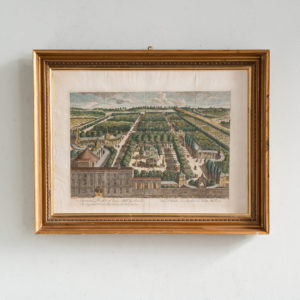
A General Prospect of Vaux Hall Gardens. Shewing at one View the disposition of the whole Gardens. Vüe Détaillee des Jardins de Vaux Hall.
£850A General Prospect of Vaux Hall Gardens. Shewing at one View the disposition of the whole Gardens. Vüe Détaillee des Jardins de Vaux Hall.
Originally engraved by William Simpkins (fl.1784-1825) for Owen Manning and William Bray’s “History and Antiquities of Surrey” (1804-1814).£850 -
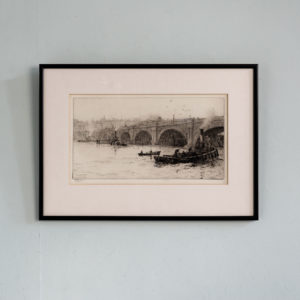
W. L Wylie R. A., Old Waterloo Bridge from the South Bank,
£850W. L Wylie R. A., Old Waterloo Bridge from the South Bank,
An original dry-point engraving by British marine artist, painter etcher and illustrator W. L. Wyllie (1851-1931) showing Old Waterloo Bridge from the Surrey shore with three steam Toshers working on the Lambeth Reach of the River Thames. Mounted and in its original frame. Old Waterloo bridge, designed and built by the engineer John Rennie was built in 1827 and stood until 1924 when the increased scour of the river, caused by the removal of the many-piered Old London Bridge, made necessary its dismantling and replacement. Signed by the artist in pencil in he margin.£850 -
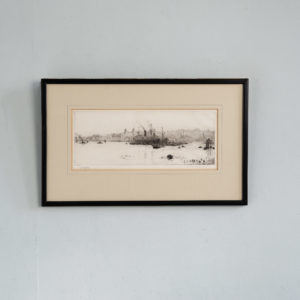
W. L Wylie R. A., Sugar boats Greenwich Reach,
£850W. L Wylie R. A., Sugar boats Greenwich Reach,
An original dry-point engraving by British marine artist, painter etcher and illustrator W. L. Wyllie (1851-1931). Signed in pencil by the artist "A view of Greenwich from the Isle of Dogs (i.e. the north-west) with figures, probably local boys, swimming off the beach in the foreground around a small lighter. The Royal Naval College is to the left and the Royal Observatory high in the background above the Park and the riverside town centre of Greenwich proper. In the centre cargo ships are unloading sugar into lighters alongside, in the deep-water mooring tier between Greenwich and Deptford. The atmosphere beyond over the shoreline is one of industrial haze through which a Thames barge, chimneys and a crane can be seen. Astern of the ships small steamers cluster off Greenwich Pier." National Maritime Museum listing.£850 -
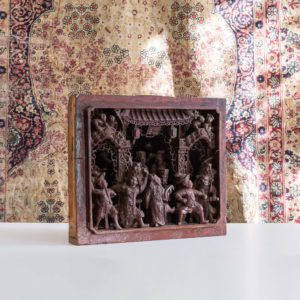
A nineteenth century carved diorama of a theatrical scene.
£850A nineteenth century carved diorama of a theatrical scene.
The carved red lacquered shaped box giving wonderful perspective of the fourteen characters on stage, a combination of dignitaries and warriors, ready to battle, the whole scene is overlooked by a dominating warrior, the proscenium arch flanked by lanterns and further figures. Some minor loses. Qing Dynasty (1636-1911)£850 -
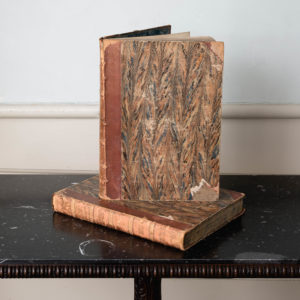
Picturesque Views on the River Thames by Samuel Ireland, 1792
£850Picturesque Views on the River Thames by Samuel Ireland, 1792
2 Volumes of 209 and 258 pages with 52 aquatint plates picturing views along the river Thames including Blenheim Castle, Windsor Castle, London bridges, Westminster Abbey, and The Royal Naval Hospital at Greenwich. Original half calf, marbled binding of 1792, rubbed and worn with faint spotting. Samuel Ireland produced a series of these scenic views of British rivers at the end of the 18th Century as the fear of French invasion prompted a national turn towards patriotic and contemplative representations of domestic subjects.£850 -
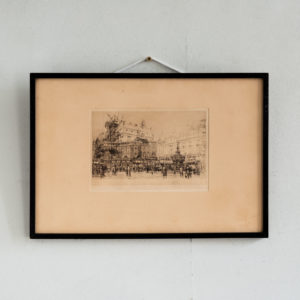
The Reconstruction of Piccadilly, William Walcot
£840The Reconstruction of Piccadilly, William Walcot
Framed and mounted black line etching by the artist-engraver William Walcot showing the rebuilding of Picadilly Circus and the Swan and Edgar building following destruction by Zeppelin raid in 1917. Issued as part of Walcot's London Set in 1924.£840 -

An oil on board landscape by Fyffe Christie,
£820An oil on board landscape by Fyffe Christie,
The depiction of rolling fields and animated sky realised in scrapes, dabs and flourishes of the palette knife, presented in a painted pine frame with gilt slip, signed bottom right,£820 -
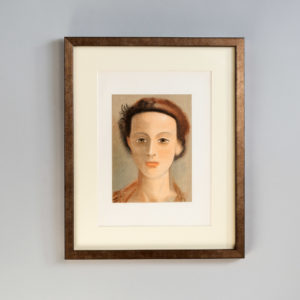
Portrait by Andre Derain, Verve Vol 2 / No. 5-6.
£800Portrait by Andre Derain, Verve Vol 2 / No. 5-6.
The Verve Review was a purposefully luxurious. It ran from 1937 to 1960, but with only 38 editions available, due to the high degree of design and editorial work dedicated to each issue. Each edition contained unique lithographic prints, commissioned by the editor, and each cover a double-page lithograph elaborated by one of the artists contained within. It was the brainchild of its editor Stratis Eleftheriades, a Greek National who moved to Paris in the early thirties to take part in the growing Modernist movement, writing under the name of Teriade.£800 -
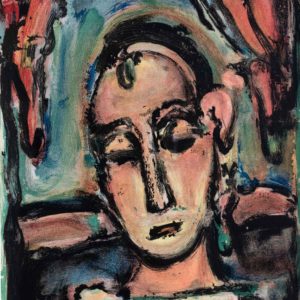
Head of a Girl by George Rouault, Verve Vol 2 / No. 5-6.
£800Head of a Girl by George Rouault, Verve Vol 2 / No. 5-6.
The Verve Review was a purposefully luxurious. It ran from 1937 to 1960, but with only 38 editions available, due to the high degree of design and editorial work dedicated to each issue. Each edition contained unique lithographic prints, commissioned by the editor, and each cover a double-page lithograph elaborated by one of the artists contained within. It was the brainchild of its editor Stratis Eleftheriades, a Greek National who moved to Paris in the early thirties to take part in the growing Modernist movement, writing under the name of Teriade.£800 -
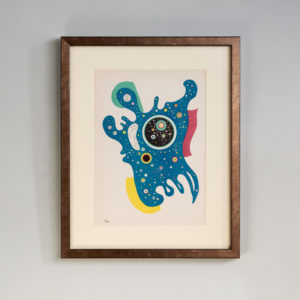
Stars by Wassily Kandinsky, Verve Vol. 1 / No. 2.
£800Stars by Wassily Kandinsky, Verve Vol. 1 / No. 2.
The Verve Review was a purposefully luxurious. It ran from 1937 to 1960, but with only 38 editions available, due to the high degree of design and editorial work dedicated to each issue. Each edition contained unique lithographic prints, commissioned by the editor, and each cover a double-page lithograph elaborated by one of the artists contained within. It was the brainchild of its editor Stratis Eleftheriades, a Greek National who moved to Paris in the early thirties to take part in the growing Modernist movement, writing under the name of Teriade.£800 -
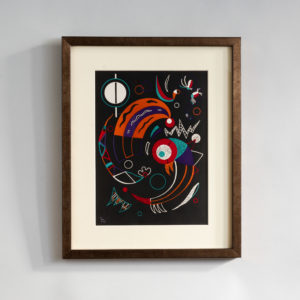
Comets by Wassily Kandinsky, Verve Vol. 1 / No. 2.
£800Comets by Wassily Kandinsky, Verve Vol. 1 / No. 2.
The Verve Review was a purposefully luxurious. It ran from 1937 to 1960, but with only 38 editions available, due to the high degree of design and editorial work dedicated to each issue. Each edition contained unique lithographic prints, commissioned by the editor, and each cover a double-page lithograph elaborated by one of the artists contained within. It was the brainchild of its editor Stratis Eleftheriades, a Greek National who moved to Paris in the early thirties to take part in the growing Modernist movement, writing under the name of Teriade.£800 -
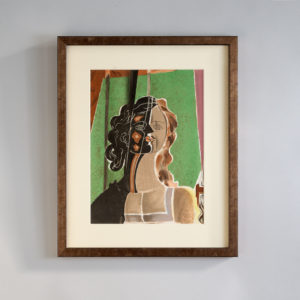
Figure by Georges Braque, Verve Vol 2 / No. 5-6.
£800Figure by Georges Braque, Verve Vol 2 / No. 5-6.
The Verve Review was a purposefully luxurious. It ran from 1937 to 1960, but with only 38 editions available, due to the high degree of design and editorial work dedicated to each issue. Each edition contained unique lithographic prints, commissioned by the editor, and each cover a double-page lithograph elaborated by one of the artists contained within. It was the brainchild of its editor Stratis Eleftheriades, a Greek National who moved to Paris in the early thirties to take part in the growing Modernist movement, writing under the name of Teriade.£800 -
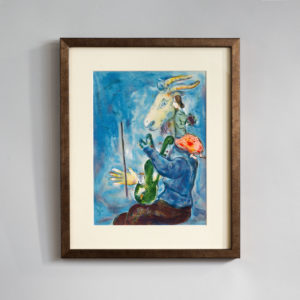
Printemps by Marc Chagall, Verve Vol. 1 / No. 3.
£800Printemps by Marc Chagall, Verve Vol. 1 / No. 3.
The Verve Review was a purposefully luxurious. It ran from 1937 to 1960, but with only 38 editions available, due to the high degree of design and editorial work dedicated to each issue. Each edition contained unique lithographic prints, commissioned by the editor, and each cover a double-page lithograph elaborated by one of the artists contained within. It was the brainchild of its editor Stratis Eleftheriades, a Greek National who moved to Paris in the early thirties to take part in the growing Modernist movement, writing under the name of Teriade.£800 -
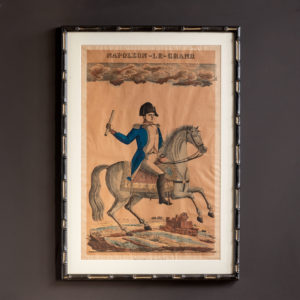
Napoleon-Le-Grand
£800Napoleon-Le-Grand
Jean-Charles Pellerin (1756 - 1836) was a French illustrator, artist, and printer. Born in Epinal, France.£800 -
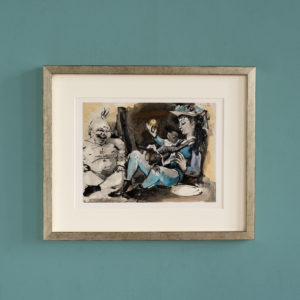
Picasso and the Human Comedy, Verve, Vol. VIII, No 29/30, 1954
£795 eachPicasso and the Human Comedy, Verve, Vol. VIII, No 29/30, 1954
Original lithograph print from Verve Vol. VIII, No 29/30 printed by the Master Printers Mourlot Frères in 1954. Framed in champagne gold with a cream mount.£795 each -
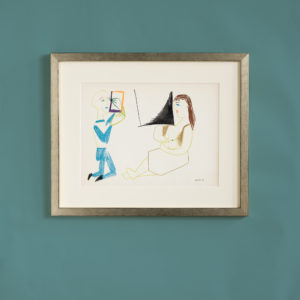
Picasso and the Human Comedy, Verve, Vol. VIII, No 29/30, 1954
£795 eachPicasso and the Human Comedy, Verve, Vol. VIII, No 29/30, 1954
Original lithograph print from Verve Vol. VIII, No 29/30 printed by the Master Printers Mourlot Frères in 1954. Framed in champagne gold with a cream mount.£795 each -
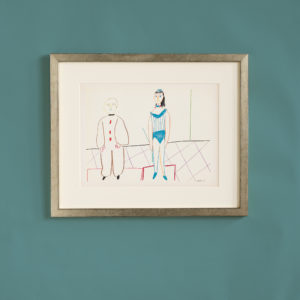
Picasso and the Human Comedy, Verve, Vol. VIII, No 29/30, 1954
£795 eachPicasso and the Human Comedy, Verve, Vol. VIII, No 29/30, 1954
Original lithograph print from Verve Vol. VIII, No 29/30 printed by the Master Printers Mourlot Frères in 1954. Framed in champagne gold with a cream mount.£795 each -
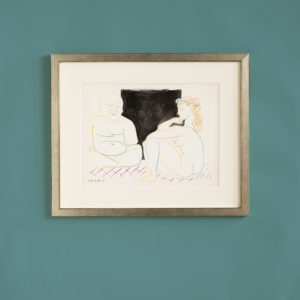
Picasso and the Human Comedy, Verve, Vol. VIII, No 29/30, 1954
£795 eachPicasso and the Human Comedy, Verve, Vol. VIII, No 29/30, 1954
Original lithograph print from Verve Vol. VIII, No 29/30 printed by the Master Printers Mourlot Frères in 1954. Framed in champagne gold with a cream mount.£795 each -
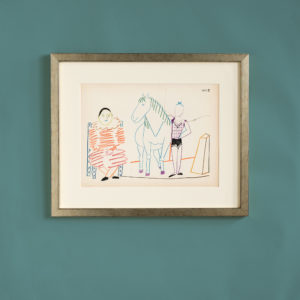
Picasso and the Human Comedy, Verve, Vol. VIII, No 29/30, 1954
£795 eachPicasso and the Human Comedy, Verve, Vol. VIII, No 29/30, 1954
Original lithograph print from Verve Vol. VIII, No 29/30 printed by the Master Printers Mourlot Frères in 1954. Framed in champagne gold with a cream mount.£795 each -
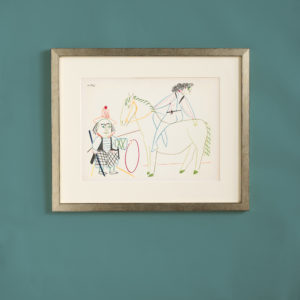
Picasso and the Human Comedy, Verve, Vol. VIII, No 29/30, 1954
£795 eachPicasso and the Human Comedy, Verve, Vol. VIII, No 29/30, 1954
Original lithograph print from Verve Vol. VIII, No 29/30 printed by the Master Printers Mourlot Frères in 1954. Framed in champagne gold with a cream mount.£795 each -
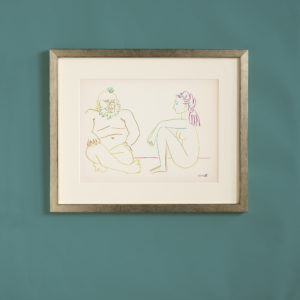
Picasso and the Human Comedy, Verve, Vol. VIII, No 29/30, 1954
£795 eachPicasso and the Human Comedy, Verve, Vol. VIII, No 29/30, 1954
Original lithograph print from Verve Vol. VIII, No 29/30 printed by the Master Printers Mourlot Frères in 1954. Framed in champagne gold with a cream mount.£795 each -
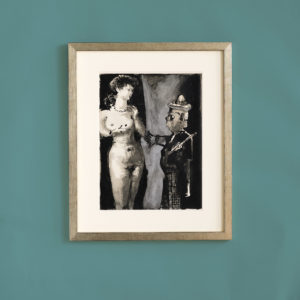
Picasso and the Human Comedy, Verve, Vol. VIII, No 29/30, 1954
£795 eachPicasso and the Human Comedy, Verve, Vol. VIII, No 29/30, 1954
Original lithograph print from Verve Vol. VIII, No 29/30 printed by the Master Printers Mourlot Frères in 1954. Framed in champagne gold with a cream mount.£795 each -
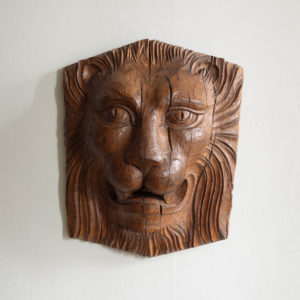
Large oak lion mask,
£775 -
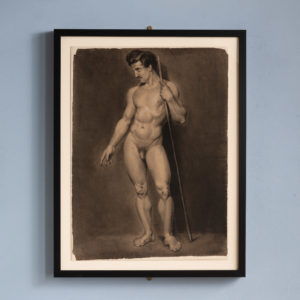
Early nineteenth century nude study,
£750Early nineteenth century nude study,
An early nineteenth century framed charcoal life-study of a male figure. The figure is shown heroically nude, from the front, in a full length, slightly serpentina pose with the right arm radiating from the torso. The composition is depicted contraposto and leaning on a spear or staff. The pose depicted is shows a slightly adapted and altered rendering of the famous Doryphorus, or Spear-Barer of Polykleitos. Polykleitos was known as the best sculptor of men in the ancient world, with the primary subjects of his works being male athletes with idealised body proportions. He was interested most chiefly in the mathematical proportions of the human form, which led him to write an essay the famous Kanon, on the proportions of humans. The Doryphoros is an illustration of his writings in Kanon on the symmetry between the body parts£750 -
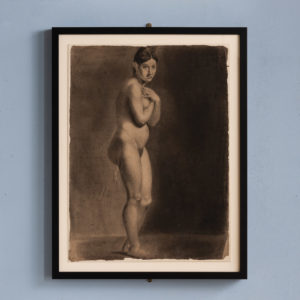
Early nineteenth century nude study,
£750Early nineteenth century nude study,
An early nineteenth century framed charcoal life-study of a female figure. The figure, shown side-on, models the Pudica pose, an affected posture of chaste virtue, inherited from classical art.£750 -
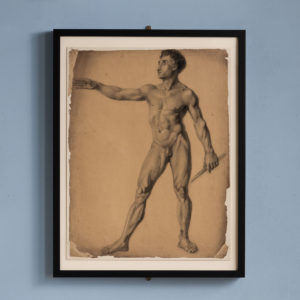
Early nineteenth century nude study,
£750Early nineteenth century nude study,
An early nineteenth century framed charcoal life-study of a male figure. The figure is shown heroically nude, from the front, in a full length, adlocutio pose, contraposto and grasping a shaft or baton. The pose is a famous one in Classical Art, said to embody power, control and leadership, and its most famous example is the Augusto di Prima Porta in the Vatican Museums in Rome.£750 -
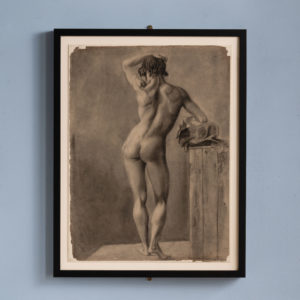
Early nineteenth century nude study,
£750Early nineteenth century nude study,
An early nineteenth century framed charcoal life-study of a male figure. The figure is shown from behind in full length, contraposto, with developed musculature and a sinuous, dramatic, figura serpentina recollecting the Dancing Faun of the Uffizi, and the famous Farnese Hercules.£750 -
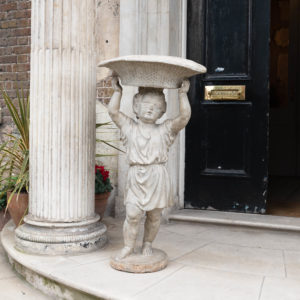
Composition stone figure of a young boy
£750 -
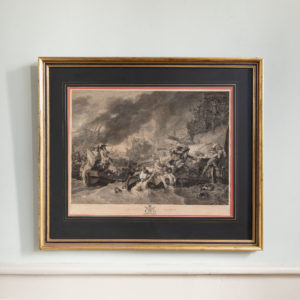
The Battle at La Hogue
£750The Battle at La Hogue
A large framed and mounted black line engraving by William Wollett afer the painting by Benjamin West showing the Anglo-Dutch naval victory at La Hogue off the coast of Normandy in 1692. " Standing in a boat at the left ... Vice Admiral George Rooke embodies heroic command with his upright posture and raised sword... Beached in the center distance is the French flagship, the Royal Sun. Actually burned and sunk a few days before this encounter, the Royal Sun is here deliberately refloated -- only to be run against the cliffs so that West might symbolize the French defeat." U.S. National Gallery of Art, Washington D.C.£750 -
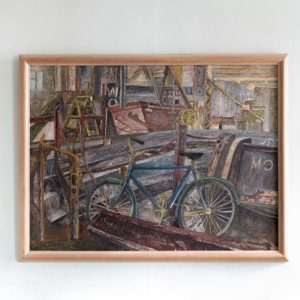
Blue Bicycle by Gary Sargeant
£750Blue Bicycle by Gary Sargeant
Framed oil on panel painting of a blue bicycle in the foreground of a derelict industrial scene by the acclaimed and widely exhibited blind painter, Gary Sergeant.£750 -
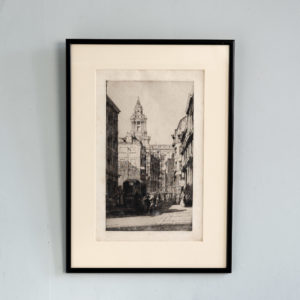
Nathaniel Sparks, The Clock Tower, St. Pauls,
£750Nathaniel Sparks, The Clock Tower, St. Pauls,
Mounted and in its original frame, an original dry-point engraving by the artist and painter-etcher Nathaniel Sparks showing the Clock Tower of St Paul's Cathedral viewed from Carter Lane. The first clock was inserted into the Great West Portico of St Paul's by Smith of Derby in 1893 and is still maintained by them to this day. Signed by the artist on the plate. Presented in a black frame with a cream mount.£750 -
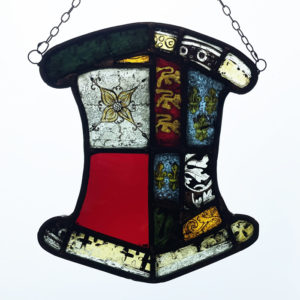
An English leaded stained glass hanger,
£745An English leaded stained glass hanger,
a cartouche-shaped light incorporating old fragments (some probably medieval): with three lions on a red ground and fleur-de-lys on blue, chain hung from wire loops,£745 -
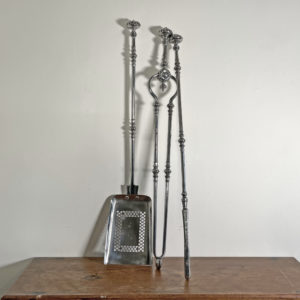
A set of polished steel fire tools,
£725A set of polished steel fire tools,
the shovel, tongs and poker with knopped shafts and gadrooned pommels, chased brass pommel caps (absent to the shovel),£725 -
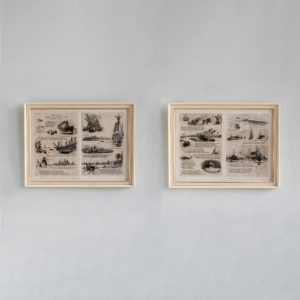
Our Fathers, To The Memory of the Nameless Killed and Wounded
£725 the pairOur Fathers, To The Memory of the Nameless Killed and Wounded
A set of four etchings in two frames depicting ships of war and life at sea in English history By William Wylie and accompanied by the words of Cpt. Ronald Hopwood's poem Our Fathers. William Lionel Wylie was the most distinguished marine artist of the late nineteenth and early twentieth centuries. He became almost a painter laureate to the Royal Navy, so much so that during his funeral, in a scene reminiscent of Nelson's state funeral in 1806, his body was rowed up Portsmouth Harbour in a naval cutter past battleships with dipped colours and bugles calling and quaysides lined with dockyard workers. Similarly Captain Ronald A Hopwood was described as the poet laureate of the Royal Navy by Time Magazine in 1941. His most enduring work, The Laws of the Navy, became and remains a sort of Works and Days primer for naval life, both inspiring and edifying seamen in the ways of the senior service. After the Battle of Jutland in 1916 when the press was critical of an apparent failure by the Royal Navy to achieve a clear victory against the Imperial German Navy the Times of London published The Old Ways, a poem by Hopwood and within this was a further poem, Our Fathers which was first written during the naval manoeuvres of 1913. Wyllie, we are told, was much taken with the verses and he arranged to illustrate them with the agreement of their author as a memorial of sorts to the dead (and perhaps as an apologia for the living) of the Battle of Jutland. The seaplane depicted appears to be a short type 184 used at Gallipoli where it became the first aircraft in the world to attack an enemy ship with an air-launched torpedo. The Battleship in the next image is of the King George V class and likely to be based on HMS Audacious, which Wylie had studied previously. The poem and illustrative etchings then go back in time to the navy of Elizabeth I's time. The sailing ships depicted are galleons of the type which chased the Spanish Armada out of the channel, a scene depicted at the bottom of the first print. The second framed picture depicts naval exercises and gunnery practice, with a galleon being scraped and caulked by hand on a secluded beach in the Spanish Main. It concludes with a scene of high-technology Super-Dreadnoughts of the Queen Elizabeth class - a naval nominative choice which perhaps inspires the scheme of the whole work of reflection.£725 the pair -
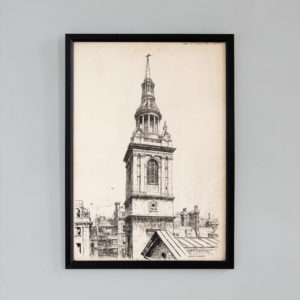
Steeple of St Mary-Le-Bow, Cheapside
£700Steeple of St Mary-Le-Bow, Cheapside
Pre-war pen and ink drawing showing the Steeple of St Mary-Le-Bow on Cheapside in the City of London. Signed by the artist.£700 -
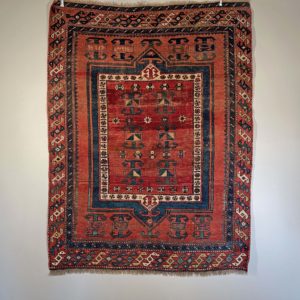
An antique Armenian Kazak rug,
£690An antique Armenian Kazak rug,
in madder red, indigo and ivory, the field containing bold hooked devices, within a birds-on-pole border; dated unclearly; low in places, restorations, washed and ready to lay,£690 -
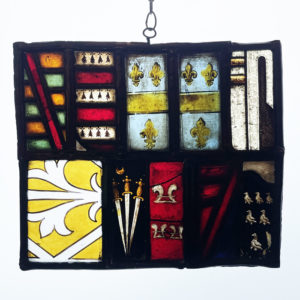
An English leaded stained glass hanger,
£675An English leaded stained glass hanger,
a rectangular light incorporating old fragments (some probably medieval): two with fleur-de-lys, one with three swords and a crescent, another with six myrtles, hung from wire loops,£675 -
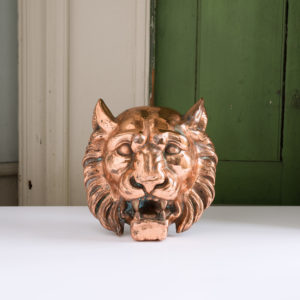
Large 1920s cast lion’s mask
£675 -
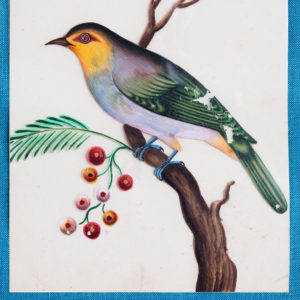
Set of Indian orthniological paintings on mica
£660 set of sixSet of Indian orthniological paintings on mica
Mica is a transparent mineral composed of complex mixtures of potassium silicates. The variety of mica used most frequently by these Indian artists is Muscovite (H2KAl3 Si04)3 which is found widely throughout south India. The mica is formed between strata of granite and the transparency of the material is a result of the heat and pressure created between the layers of rock during formation. Mica consists of many interlocking platelets, resulting in a laminar structure which can be split easily into thin sheets.£660 set of six -
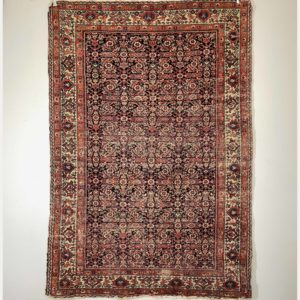
An antique Feraghan rug
£650An antique Feraghan rug
the 'all over' polychrome pattern within triple mint green and madder red border stripes; two small patches, low all over; cleaned and ready to lay,£650 -
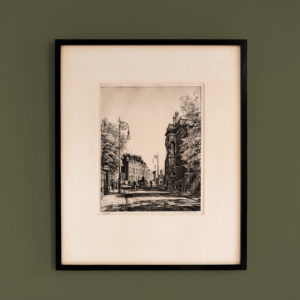
Poplar
£650Poplar
An original framed and mounted dry-point engraving by the artist engraver Frances Dodd RA showing Poplar Old Town hall on Newby Place in 1930. Hand signed in pencil by the artist.£650 -
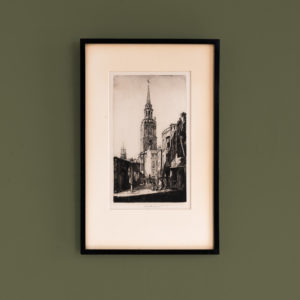
St. James’s Church Clerkenwell
£650St. James’s Church Clerkenwell
A framed and mounted black line etching by the English artist Sir Henry Rushbury KCVO CBE RA (28 October 1889 – 5 July 1968) depicting St James's Church Clerkenwell. Signed in pencil by the artist. Clerkenwell contained a notorious slum at the turn of the 20h Century and was the setting for George Gissing's Novel, The Netherworld - "Opposite, the shapes of poverty-eaten houses and grimy workshops stood huddling in the obscurity. From near at hand came shrill voices of children chasing each other about – children playing at midnight between slum and gaol!"£650 -
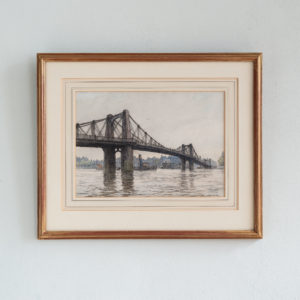
Lambeth Bridge With Shipping
£650Lambeth Bridge With Shipping
Pedestrians idle on the parapet of Old Lambeth Bridge while a steam tug passes beneath the central arch towing a Thames barge. Warehouses, wharves and houses line the Westminster shore. A Framed and mounted mixed media sketch by the artist Hubert Williams showing Old Lambeth Bridge prior to it's demolition in 1928. Signed on the plate by the artist.£650 -
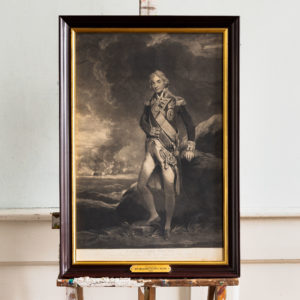
Admiral Lord Nelson at Copenhagen,
£650Admiral Lord Nelson at Copenhagen,
A framed mezzotint engraving of Admiral Lord Nelson at the battle of Copenhagen by Charles Turner, after John Hoppner. From the collection of Sir John Malcolm Fraser, 1st Baronet, journalist, Royal Naval captain, and vice-chairman of the Conservative Party.£650 -
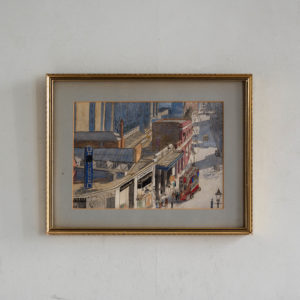
Watercolour of South Kensington Station
£650Watercolour of South Kensington Station
Framed watercolour of South Kensington underground station, painted in the mid 1920's. Captured from a window of No.1 Old Brompton Road, the viewer is shown the view looking east over the station roof and down Pelham Street towards Brompton Cross. The scene shows a winter's day with passengers climbing aboard the upper deck of K-Type Omnibus.£650 -
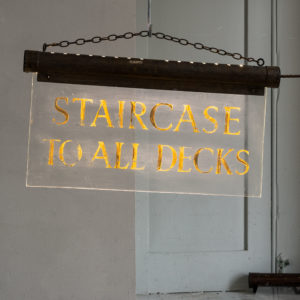
Perspex and brass illuminated sign
£650Perspex and brass illuminated sign
the typography signwritten, re-wired and PAT tested. Mid-twentieth century.£650 -
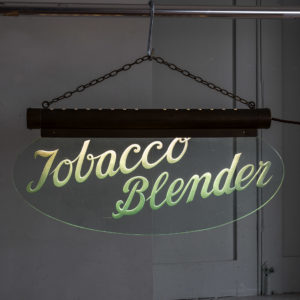
Glass and brass illuminated sign
£650 -
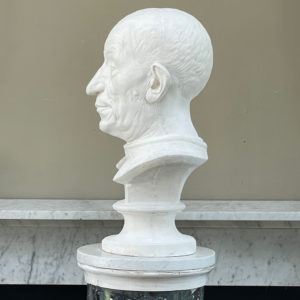
A cast plaster bust of the Florentine merchant, Pietro Mellini,
£630A cast plaster bust of the Florentine merchant, Pietro Mellini,
the head and neck bust, an abbreviation of the opulently robed head and upper torso original, mounted on a circular socle base. Cast by LASSCO in our Three Pigeons workshops,£630 -
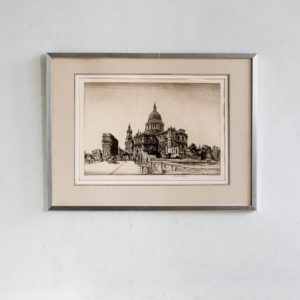
St. Paul’s Cathedral from Cannon Street
£625St. Paul’s Cathedral from Cannon Street
A famed drypoint engraving of a bomb-damaged St Pauls viewed from Cannon Street dated 1942 by the War Artist Sir Henry Rushbury KCVO CBE RA (28 October 1889 – 5 July 1968). Signed and dated by the artist.£625 -
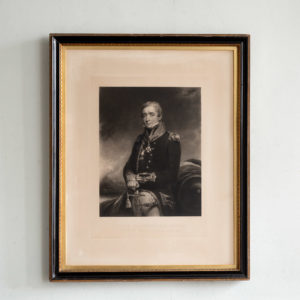
Captain Sir Christopher Cole,
£605Captain Sir Christopher Cole,
A framed portrait engraving by George H Phillips from the painting by William Owen R.A. showing the Naval Officer an statesman Captain Sir Christopher Cole.£605 -
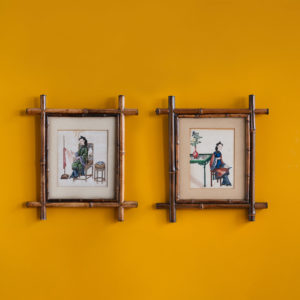
Pair of 19th Century Traditional Chinese Figure Paintings.
£600 the pairPair of 19th Century Traditional Chinese Figure Paintings.
Chinese pith paintings came into use for painting to satisfy the increasing demand for small, inexpensive and easily transported souvenirs, following the massive growth in the China Trade in the first quarter of the nineteenth century. Because of the nature of pith and its cellular structure, the gouache used by the Chinese sat on the surface and produced a bright and even sparkling effect.£600 the pair -
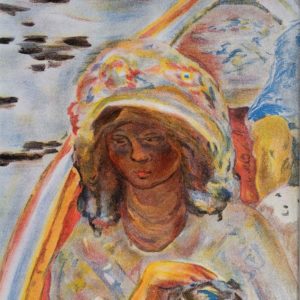
Portrait Fragment by Pierre Bonnard, Verve Vol 2 / No. 5-6.
£600Portrait Fragment by Pierre Bonnard, Verve Vol 2 / No. 5-6.
The Verve Review was a purposefully luxurious. It ran from 1937 to 1960, but with only 38 editions available, due to the high degree of design and editorial work dedicated to each issue. Each edition contained unique lithographic prints, commissioned by the editor, and each cover a double-page lithograph elaborated by one of the artists contained within. It was the brainchild of its editor Stratis Eleftheriades, a Greek National who moved to Paris in the early thirties to take part in the growing Modernist movement, writing under the name of Teriade.£600 -
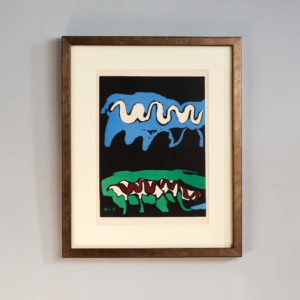
The Four Elements, Earth by Francisco Bores, Verve Vol. 1 / No. 1.
£600The Four Elements, Earth by Francisco Bores, Verve Vol. 1 / No. 1.
The Verve Review was a purposefully luxurious. It ran from 1937 to 1960, but with only 38 editions available, due to the high degree of design and editorial work dedicated to each issue. Each edition contained unique lithographic prints, commissioned by the editor, and each cover a double-page lithograph elaborated by one of the artists contained within. It was the brainchild of its editor Stratis Eleftheriades, a Greek National who moved to Paris in the early thirties to take part in the growing Modernist movement, writing under the name of Teriade.£600 -
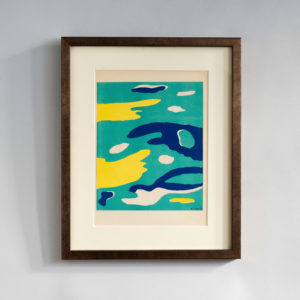
The Four Elements, Water by Fernand Leger, Verve Vol. 1 / No. 1.
£600The Four Elements, Water by Fernand Leger, Verve Vol. 1 / No. 1.
The Verve Review was a purposefully luxurious. It ran from 1937 to 1960, but with only 38 editions available, due to the high degree of design and editorial work dedicated to each issue. Each edition contained unique lithographic prints, commissioned by the editor, and each cover a double-page lithograph elaborated by one of the artists contained within. It was the brainchild of its editor Stratis Eleftheriades, a Greek National who moved to Paris in the early thirties to take part in the growing Modernist movement, writing under the name of Teriade.£600 -
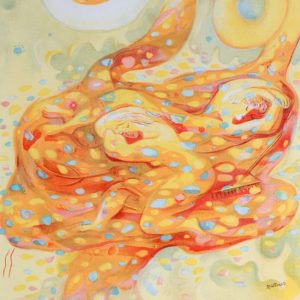
Autumn by Abraham Rattner, Verve Vol. 1 / No. 3.
£600Autumn by Abraham Rattner, Verve Vol. 1 / No. 3.
The Verve Review was a purposefully luxurious. It ran from 1937 to 1960, but with only 38 editions available, due to the high degree of design and editorial work dedicated to each issue. Each edition contained unique lithographic prints, commissioned by the editor, and each cover a double-page lithograph elaborated by one of the artists contained within. It was the brainchild of its editor Stratis Eleftheriades, a Greek National who moved to Paris in the early thirties to take part in the growing Modernist movement, writing under the name of Teriade.£600 -
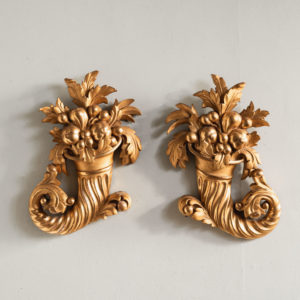
Pair of twentieth century giltwood cornucopia
£600 -
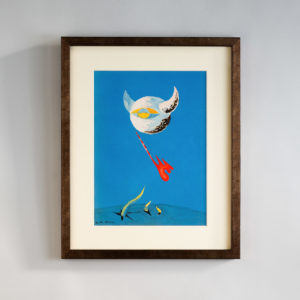
The Moon by André Masson, Verve Vol. 1 / No. 2.
£600The Moon by André Masson, Verve Vol. 1 / No. 2.
The Verve Review was a purposefully luxurious. It ran from 1937 to 1960, but with only 38 editions available, due to the high degree of design and editorial work dedicated to each issue. Each edition contained unique lithographic prints, commissioned by the editor, and each cover a double-page lithograph elaborated by one of the artists contained within. It was the brainchild of its editor Stratis Eleftheriades, a Greek National who moved to Paris in the early thirties to take part in the growing Modernist movement, writing under the name of Teriade.£600 -
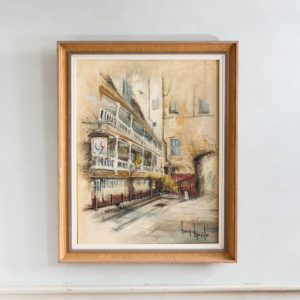
The George Inn, Borough High Street
£600The George Inn, Borough High Street
Typical heavy impasto work of Ben Maile painted in 1969. Framed£600 -
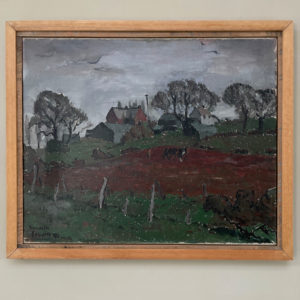
Greville Irwin, Farm Near Bollington, oil on canvas,
£595Greville Irwin, Farm Near Bollington, oil on canvas,
a rural scene on an overcast day; the paint surface appears stable, an indentation to the left inside the stretcher; the title written to the the reverse, also '(R.A. 1946)'; later oak frame and reclaimed teak slip,£595 -
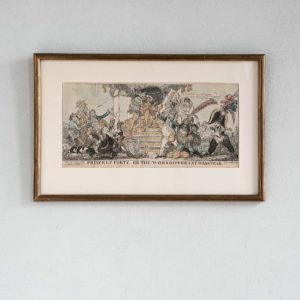
Princely Piety, or the worshippers at Wanstead,
£595Princely Piety, or the worshippers at Wanstead,
A hand-coloured etching by the caricaturist George Cruikshank depicting the wooing of a wealthy young heiress by a cast of reprobate suitors. Upon the death of her only brother James at the age of 11 in 1805 Catherine Tylney-Long became the richest commoner in England in her own right. At the tender of of 16 the 'Wiltshire Heiress' had come into a fortune of nearly £30,000,000 in today's money. This made the poor girl a prime target for every fortune hunter and indebted rake in England who wished to clear his creditors. The law as it stood in the early 19th Century had degenerated to such a degree that, under the principle of coverture, it denied a married woman any property at all in her own right while her legal existence as a feme covert was entirely subsumed in that of her husband. This left the wealthy orphan daughter of Sir James Tylney long, 7th Baronet in a difficult and precarious position, caught between the social stigma attached to unmarried womanhood and the appeals of a host of insinuating cads seeking her hand in marriage. Here Cruikshank depicts the many and assorted indigent suitors for the hand of the wealthy heiress. To the left of the dais are shown Lord Kilworth and William Wesley-Pole, later 4th Earl of Mornington a dissipated Anglo-Irish nobleman, who dueled over the courtship of Catherine. Kneeling at the foot of the steps we may also see the figure of Romeo Coates, unintentionally comic actor and 'improver' of Shakespeare included apparently 'not because of his pretensions, but his boasts and wishes'. Above him we see the fop and jobbing playwright, Sir Lumley Skeffington laying his poetic efforts at the feet of the heiress. On the right hand we see The Duke of Clarence, later William IV who by this point had debts of many hundreds of thousands of pounds holding back Baron-de-Geramb, a Spanish military adventurer and suspected Napoleonic spy who later became a Trappist monk where he used his position as procurator-general of that ancient order to defray his personal expenses. Above the Duke we see reproving the figure of Mrs Jordan, his 'common-law' wife with whom he had fathered many children at his retreat of Bushey Park. The farcical presentation of the situation belies it's tragic outcome. Perhaps cajoled by just such unkind insinuations as are repeated in this caricature Catherine would choose the worst-of-the-bunch, William Wesley-Pole, as her preferred suitor. William Wesley-Pole-Tylney-Long, as he became by Royal Licence in 1812, was an unredeemed rake and not only abused and impoverished his saintly young wife but also passed her a debilitating infection and caused her family seat at Wanstead House to be demolished and sold for salvage. After a short and unhappy marriage Catherine died at the age of only 35 after receiving a final brutal letter from her estranged husband, the contents of which apparently caused her to have some form of seizure. Frustrated in his efforts to gain custody of their son William, on whom the family fortune had devolved, William Pole Tylney-Long-Wellesley, 4th Earl of Mornington (the final name by which he was known) died in 1857 unwept, unhonoured and unsung if also unrepentant. His obituary in the Morning Star described him as "A spendthrift, a profligate, and a gambler in his youth, he became debauched in his manhood... redeemed by no single virtue, adorned by no single grace, his life gone out even without a flicker of repentance".£595 -
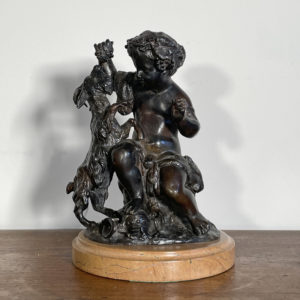
A cast bronze group of the young Bacchus with goat,
£580A cast bronze group of the young Bacchus with goat,
the young deity with vine leaf garland, his foot rested on a drained ewer, feeding grapes to the standing ruminant, mounted on a circular marble base,£580 -
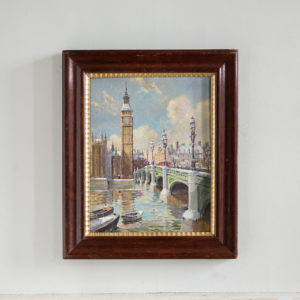
Palace of Westminster
£580Palace of Westminster
Bert Pugh (1904-2001) sometimes known as Sullivan Pugh, born in Kilmarnock, Ayrshire. When he was young his family moved to London, where he spent much of his life, joining the Chelsea Art Club. Pugh studied for three years at a building school, at 17 becoming an architectural and ecclesiastical draughtsman, church craftsman and woodcarver, afterwards designing bookplates and practising calligraphy. While owning a commercial art studio in the Strand, he spent evenings studying from life and painting and began to exhibit in the capital. Pugh also spent some time as a commercial artist with the advertising agency J. Walter Thompson.£580 -
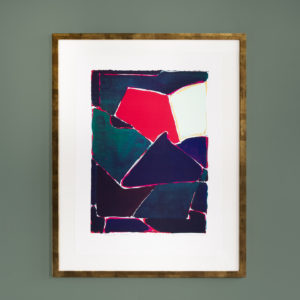
Black Hill, by Gordon House
£575 eachBlack Hill, by Gordon House
Gordon House was a graphic designer and abstract painter. He went to art school in Luton, then later, won a scholarship to St. Albans. During the 1950’s he spent much time in Letchworth, Welwyn and working for Imperial Chemical Industries (ICI) becoming aware of a modernist style of graphics through the design of European pharmaceutical packaging. This style was new to British eyes at the time and he went on to design the graphics for many galleries during the 1960’s. Mixing in new circles he collaborated with leading artists like Peter Blake and Richard Hamilton. He was responsible for the white on white emboss of the band’s name across the record sleeve on the Beatles White album against the wishes of Hamilton, who wanted to leave the sleeves totally blank, save for the stamp of a unique issue number. The Tate Gallery holds more than 100 of his prints and his work is also represented in many important public collections including the Arts Council, the British Council, the Victoria & Albert Museum and the M.O.M.A. in New York.£575 each -
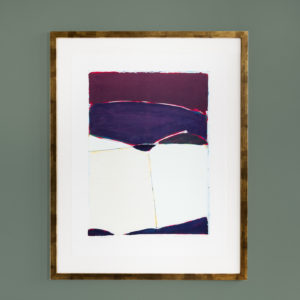
Black Hill, Pages, by Gordon House
£575 eachBlack Hill, Pages, by Gordon House
Gordon House was a graphic designer and abstract painter. He went to art school in Luton, then later, won a scholarship to St. Albans. During the 1950’s he spent much time in Letchworth, Welwyn and working for Imperial Chemical Industries (ICI) becoming aware of a modernist style of graphics through the design of European pharmaceutical packaging. This style was new to British eyes at the time and he went on to design the graphics for many galleries during the 1960’s. Mixing in new circles he collaborated with leading artists like Peter Blake and Richard Hamilton. He was responsible for the white on white emboss of the band’s name across the record sleeve on the Beatles White album against the wishes of Hamilton, who wanted to leave the sleeves totally blank, save for the stamp of a unique issue number. The Tate Gallery holds more than 100 of his prints and his work is also represented in many important public collections including the Arts Council, the British Council, the Victoria & Albert Museum and the M.O.M.A. in New York.£575 each -
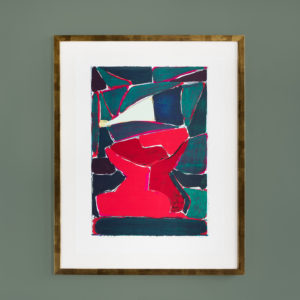
Black Hill, Rostra, by Gordon House
£575 eachBlack Hill, Rostra, by Gordon House
Gordon House was a graphic designer and abstract painter. He went to art school in Luton, then later, won a scholarship to St. Albans. During the 1950’s he spent much time in Letchworth, Welwyn and working for Imperial Chemical Industries (ICI) becoming aware of a modernist style of graphics through the design of European pharmaceutical packaging. This style was new to British eyes at the time and he went on to design the graphics for many galleries during the 1960’s. Mixing in new circles he collaborated with leading artists like Peter Blake and Richard Hamilton. He was responsible for the white on white emboss of the band’s name across the record sleeve on the Beatles White album against the wishes of Hamilton, who wanted to leave the sleeves totally blank, save for the stamp of a unique issue number. The Tate Gallery holds more than 100 of his prints and his work is also represented in many important public collections including the Arts Council, the British Council, the Victoria & Albert Museum and the M.O.M.A. in New York.£575 each -
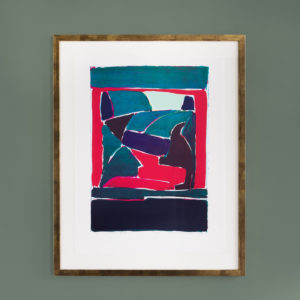
Black Hill, Work Shop, by Gordon House
£575 eachBlack Hill, Work Shop, by Gordon House
Gordon House was a graphic designer and abstract painter. He went to art school in Luton, then later, won a scholarship to St. Albans. During the 1950’s he spent much time in Letchworth, Welwyn and working for Imperial Chemical Industries (ICI) becoming aware of a modernist style of graphics through the design of European pharmaceutical packaging. This style was new to British eyes at the time and he went on to design the graphics for many galleries during the 1960’s. Mixing in new circles he collaborated with leading artists like Peter Blake and Richard Hamilton. He was responsible for the white on white emboss of the band’s name across the record sleeve on the Beatles White album against the wishes of Hamilton, who wanted to leave the sleeves totally blank, save for the stamp of a unique issue number. The Tate Gallery holds more than 100 of his prints and his work is also represented in many important public collections including the Arts Council, the British Council, the Victoria & Albert Museum and the M.O.M.A. in New York.£575 each -
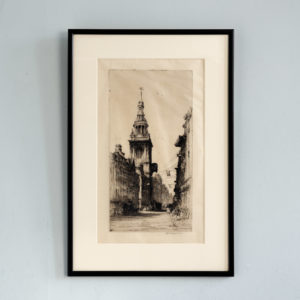
Nathaniel Sparks, St Mary-le-Bow, Cheapside,
£570Nathaniel Sparks, St Mary-le-Bow, Cheapside,
An original dry-point engraving by the artist and painter-etcher Nathaniel Sparks showing the steeple of St Mary le Bow viewed looking west up Cheapside. Signed by the artist. Presented in a cream mount and black frame.£570 -
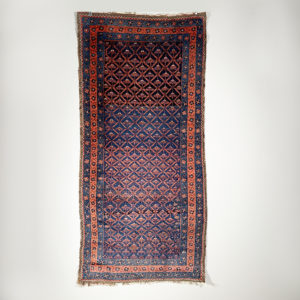
An antique Baluchi rug
£565An antique Baluchi rug
the abrashed indigo field with all over lattice design in red within the red and blue triple stripe border; with a soft, full pile, unusual for an old Baluch; cleaned,£565 -
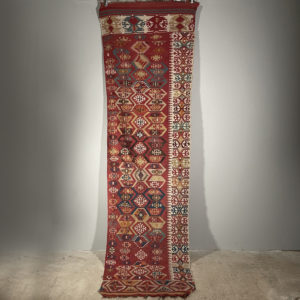
An antique Turkish kilim
£550An antique Turkish kilim
a single kilim strip, bordered to three sides, the madder red field with repeating hexagonal motifs, eagle designs to the border; cleaned,£550 -
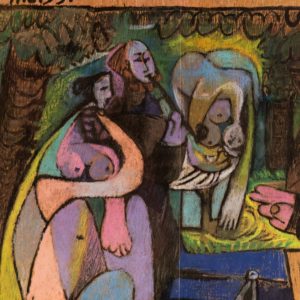
Pablo Picasso, Lithograph based on Edouard Manet’s, Luncheon on the the Grass. c1962
£550Pablo Picasso, Lithograph based on Edouard Manet’s, Luncheon on the the Grass. c1962
From 1959-1962 Pablo Picasso and his second wife Jacqueline lived at Château de Vauvenargues near Aix-en-Provence. He spent most of his time of his time on 140 drawings and 27 paintings, lino-cuts and cardboard models all on the theme of Manet’s, Le Déjeuner sur l’herbe. Manet's original painting from 1862 showing a nude woman sitting between two fully clothed men was a scandal for the time.£550 -
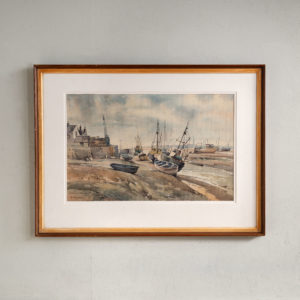
Leigh on Sea, Albert Houghton
£550Leigh on Sea, Albert Houghton
Mounted and framed watercolour painting by the English artist and painter, Albert Houghton showing fishing boats at Leigh on Sea, Essex. 1970, signed by the artist.£550 -
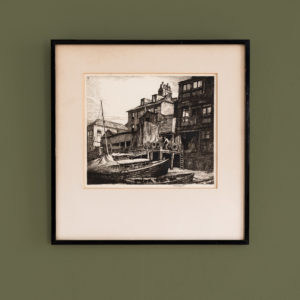
Buildings & Boats
£550Buildings & Boats
A framed and mounted black line etching by the artist-engraver Norman Jones RWS RE RSMA, showing a riverside wharf scene in the Lower Pool of the River Thames, possibly corresponding to the river frontage of Narrow Street, Limehouse. Signed in pencil by the artist.£550 -
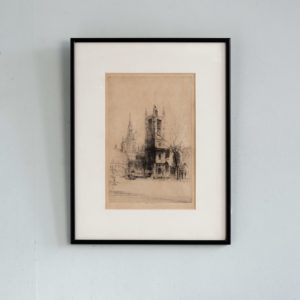
Frederick Farrell, St. Margarets Church, Westminster,
£550Frederick Farrell, St. Margarets Church, Westminster,
A framed and mounted original etching by Frederick Arthur Farrell depicting St Margaret's Church Westminster from across Parliament Square. Hand signed by the artist in pencil.£550 -
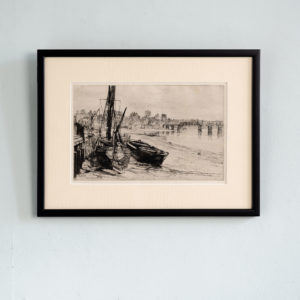
Charles Watson, Chelsea
£550Charles Watson, Chelsea
A framed and mounted etching by the English artist Charles Watson (1846-1927) depicting the foreshore at Chelsea with two barges at low tide. In the distance is shown the tower of Chelsea Old Church and a part of Old Battersea Bridge, replaced in 1890. The vantage is from close to the current site of the Chelsea Yacht and Boat Yard. Signed on the plate.£550 -
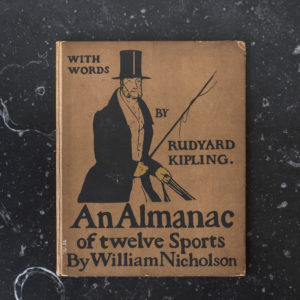
An Almanac of Twelve Sports by William Nicholson,
£550An Almanac of Twelve Sports by William Nicholson,
The Almanac was first published by Heinemann in London for Christmas 1897 with a calendar for the year 1898. Sir William Nicholson was a late 19th Century painter and print-maker. His experiments with woodcut printing encouraged the development of his distinctive pictorial style. After making his name with a series of twelve portraits of public figures (which won a gold medal at the 1900 Exposition Universelle in Paris) he moved on to produce this Almanac of twelve sports for his new publisher, Heinemann. The accompanying text was provided by the poet Rudyard Kipling. Kipling was not an enthusiastic sportsman, in fact he derided 'flannelled fools at the wicket' and 'muddied oafs at the goal' in his poem The Islanders however, after sitting for a Nicholson portrait, he agreed to provide a set of short poems to match the depicted sports. Kipling adopted a concise and suggestive style for the poems, harking back to his Departmental ditties of the 1880's. One verse at least, the draft couplet for the coaching party depicted in August, was considered too suggestive by half and was excised by Heinemann as unsuitable for the family audience he had in mind:'Youth on the box and liquor in the boot / My Lord drives out with my Lord's prostitute.'
£550 -
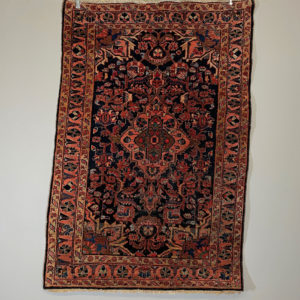
An antique Josan Sarouk rug
£525An antique Josan Sarouk rug
the indigo field with polychrome foliate pattern and spandrels with pink central medallion; stiff handle, low pile in places; cleaned and ready to lay,£525 -
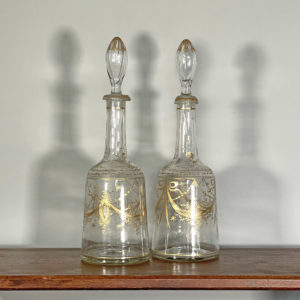
A pair of sugarloaf magnum decanters,
£520A pair of sugarloaf magnum decanters,
hand blown with gilt decoration, each with original blown lozenge shaped stopper,£520 -
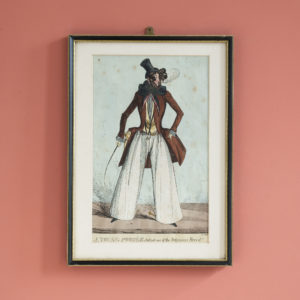
‘A Young Poodle, but not one of the Sagacious Breed’
£520‘A Young Poodle, but not one of the Sagacious Breed’
Caricaturist, presumably of Irish background, but undocumented. Responsible for a small number of plates in a distinctive hand. Unclear whether he etched them all or only designed them. Never a publisher. Worked for P.Roberts and J.Aitken. Many unsigned prints by both men may well be by him.£520 -
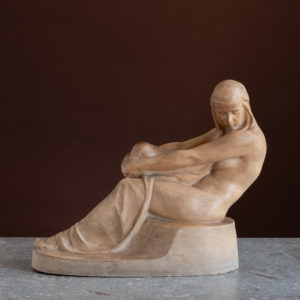
Art Deco Terracotta Mantle Figure of a Reclining Female.
£500Art Deco Terracotta Mantle Figure of a Reclining Female.
The patinated cast terracotta figure of a reclining female, head bowed, with one leg drawn towards her, and draped material over her legs. An indecipherable signature to base. Possible French.£500 -
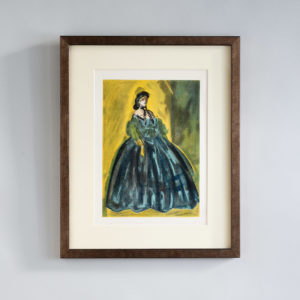
Portraits Part II by Constantin Guys, Verve Vol 2 / No. 5-6.
£500Portraits Part II by Constantin Guys, Verve Vol 2 / No. 5-6.
The Verve Review was a purposefully luxurious. It ran from 1937 to 1960, but with only 38 editions available, due to the high degree of design and editorial work dedicated to each issue. Each edition contained unique lithographic prints, commissioned by the editor, and each cover a double-page lithograph elaborated by one of the artists contained within. It was the brainchild of its editor Stratis Eleftheriades, a Greek National who moved to Paris in the early thirties to take part in the growing Modernist movement, writing under the name of Teriade.£500 -
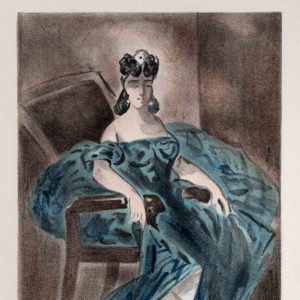
Portraits Part I by Constantin Guys, Verve Vol 2 / No. 5-6.
£500Portraits Part I by Constantin Guys, Verve Vol 2 / No. 5-6.
The Verve Review was a purposefully luxurious. It ran from 1937 to 1960, but with only 38 editions available, due to the high degree of design and editorial work dedicated to each issue. Each edition contained unique lithographic prints, commissioned by the editor, and each cover a double-page lithograph elaborated by one of the artists contained within. It was the brainchild of its editor Stratis Eleftheriades, a Greek National who moved to Paris in the early thirties to take part in the growing Modernist movement, writing under the name of Teriade.£500 -
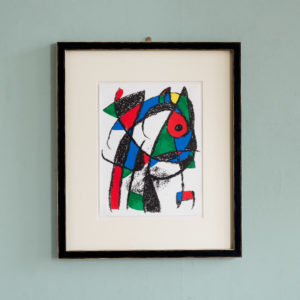
Joan Miró, Lithographie originale
£500Joan Miró, Lithographie originale
Joan Miró produced nearly 1,800 original lithographs and prints at the Maeght studio. He composed his score, invented his alphabet, scattered his symbols across the white page of his writing, close to graffiti. Everything was free, released, aerial, penetrated with interior light. He celebrated marriages between all techniques. Nothing was ever excessive or gratuitous. His creation cut to the essential. Miró created his own language. Dots, lines, scratches, graffiti, writing, mysterious anthropomorphic figures swimming or flying through infinite territory, fed by sparks. The power of black, awestruck colors… And the paper always defended its whiteness. Miró was about drawing above all else. His energy burst on to the sheet.£500 -
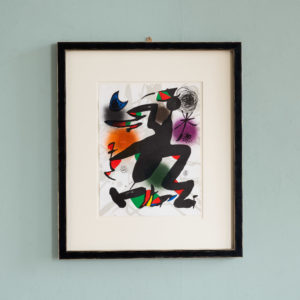
Joan Miró, Lithographie originale
£500Joan Miró, Lithographie originale
Joan Miró produced nearly 1,800 original lithographs and prints at the Maeght studio. He composed his score, invented his alphabet, scattered his symbols across the white page of his writing, close to graffiti. Everything was free, released, aerial, penetrated with interior light. He celebrated marriages between all techniques. Nothing was ever excessive or gratuitous. His creation cut to the essential. Miró created his own language. Dots, lines, scratches, graffiti, writing, mysterious anthropomorphic figures swimming or flying through infinite territory, fed by sparks. The power of black, awestruck colors… And the paper always defended its whiteness. Miró was about drawing above all else. His energy burst on to the sheet.£500 -
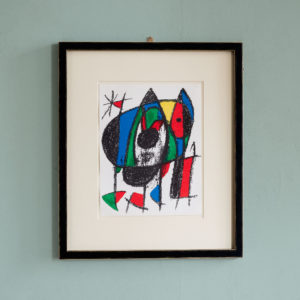
Joan Miró, Lithographie originale
£500Joan Miró, Lithographie originale
Joan Miró produced nearly 1,800 original lithographs and prints at the Maeght studio. He composed his score, invented his alphabet, scattered his symbols across the white page of his writing, close to graffiti. Everything was free, released, aerial, penetrated with interior light. He celebrated marriages between all techniques. Nothing was ever excessive or gratuitous. His creation cut to the essential. Miró created his own language. Dots, lines, scratches, graffiti, writing, mysterious anthropomorphic figures swimming or flying through infinite territory, fed by sparks. The power of black, awestruck colors… And the paper always defended its whiteness. Miró was about drawing above all else. His energy burst on to the sheet.£500 -
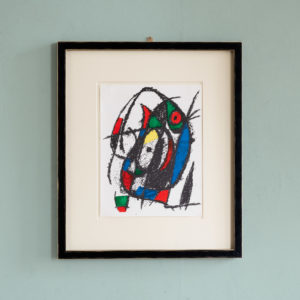
Joan Miró, Lithographie originale
£500Joan Miró, Lithographie originale
Joan Miró produced nearly 1,800 original lithographs and prints at the Maeght studio. He composed his score, invented his alphabet, scattered his symbols across the white page of his writing, close to graffiti. Everything was free, released, aerial, penetrated with interior light. He celebrated marriages between all techniques. Nothing was ever excessive or gratuitous. His creation cut to the essential. Miró created his own language. Dots, lines, scratches, graffiti, writing, mysterious anthropomorphic figures swimming or flying through infinite territory, fed by sparks. The power of black, awestruck colors… And the paper always defended its whiteness. Miró was about drawing above all else. His energy burst on to the sheet.£500 -
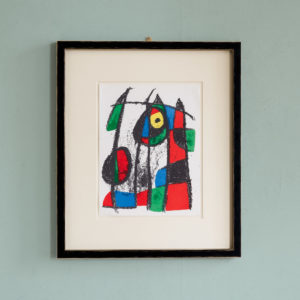
Joan Miró, Lithographie originale
£500Joan Miró, Lithographie originale
Joan Miró produced nearly 1,800 original lithographs and prints at the Maeght studio. He composed his score, invented his alphabet, scattered his symbols across the white page of his writing, close to graffiti. Everything was free, released, aerial, penetrated with interior light. He celebrated marriages between all techniques. Nothing was ever excessive or gratuitous. His creation cut to the essential. Miró created his own language. Dots, lines, scratches, graffiti, writing, mysterious anthropomorphic figures swimming or flying through infinite territory, fed by sparks. The power of black, awestruck colors… And the paper always defended its whiteness. Miró was about drawing above all else. His energy burst on to the sheet.£500 -
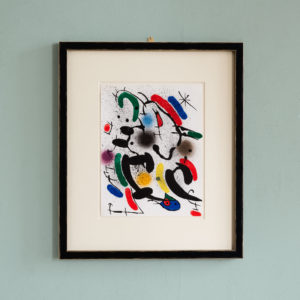
Joan Miró, Lithographie originale
£500Joan Miró, Lithographie originale
Joan Miró produced nearly 1,800 original lithographs and prints at the Maeght studio. He composed his score, invented his alphabet, scattered his symbols across the white page of his writing, close to graffiti. Everything was free, released, aerial, penetrated with interior light. He celebrated marriages between all techniques. Nothing was ever excessive or gratuitous. His creation cut to the essential. Miró created his own language. Dots, lines, scratches, graffiti, writing, mysterious anthropomorphic figures swimming or flying through infinite territory, fed by sparks. The power of black, awestruck colors… And the paper always defended its whiteness. Miró was about drawing above all else. His energy burst on to the sheet.£500 -
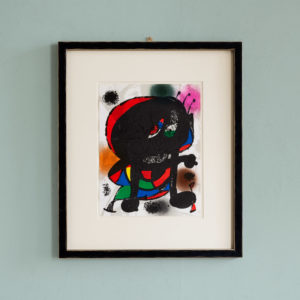
Joan Miró, Lithographie originale
£500Joan Miró, Lithographie originale
Joan Miró produced nearly 1,800 original lithographs and prints at the Maeght studio. He composed his score, invented his alphabet, scattered his symbols across the white page of his writing, close to graffiti. Everything was free, released, aerial, penetrated with interior light. He celebrated marriages between all techniques. Nothing was ever excessive or gratuitous. His creation cut to the essential. Miró created his own language. Dots, lines, scratches, graffiti, writing, mysterious anthropomorphic figures swimming or flying through infinite territory, fed by sparks. The power of black, awestruck colors… And the paper always defended its whiteness. Miró was about drawing above all else. His energy burst on to the sheet.£500 -
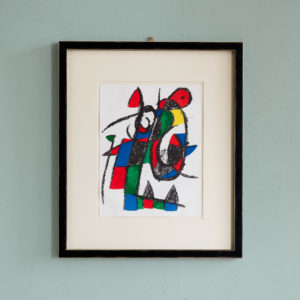
Joan Miró, Lithographie originale
£500Joan Miró, Lithographie originale
Joan Miró produced nearly 1,800 original lithographs and prints at the Maeght studio. He composed his score, invented his alphabet, scattered his symbols across the white page of his writing, close to graffiti. Everything was free, released, aerial, penetrated with interior light. He celebrated marriages between all techniques. Nothing was ever excessive or gratuitous. His creation cut to the essential. Miró created his own language. Dots, lines, scratches, graffiti, writing, mysterious anthropomorphic figures swimming or flying through infinite territory, fed by sparks. The power of black, awestruck colors… And the paper always defended its whiteness. Miró was about drawing above all else. His energy burst on to the sheet.£500 -
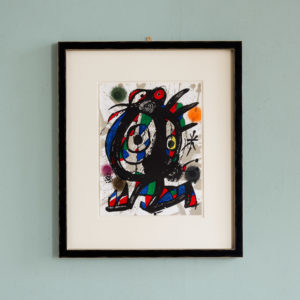
Joan Miró, Lithographie originale
£500Joan Miró, Lithographie originale
Joan Miró produced nearly 1,800 original lithographs and prints at the Maeght studio. He composed his score, invented his alphabet, scattered his symbols across the white page of his writing, close to graffiti. Everything was free, released, aerial, penetrated with interior light. He celebrated marriages between all techniques. Nothing was ever excessive or gratuitous. His creation cut to the essential. Miró created his own language. Dots, lines, scratches, graffiti, writing, mysterious anthropomorphic figures swimming or flying through infinite territory, fed by sparks. The power of black, awestruck colors… And the paper always defended its whiteness. Miró was about drawing above all else. His energy burst on to the sheet.£500 -
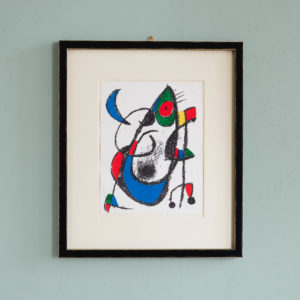
Joan Miró, Lithographie originale
£500Joan Miró, Lithographie originale
Joan Miró produced nearly 1,800 original lithographs and prints at the Maeght studio. He composed his score, invented his alphabet, scattered his symbols across the white page of his writing, close to graffiti. Everything was free, released, aerial, penetrated with interior light. He celebrated marriages between all techniques. Nothing was ever excessive or gratuitous. His creation cut to the essential. Miró created his own language. Dots, lines, scratches, graffiti, writing, mysterious anthropomorphic figures swimming or flying through infinite territory, fed by sparks. The power of black, awestruck colors… And the paper always defended its whiteness. Miró was about drawing above all else. His energy burst on to the sheet.£500 -
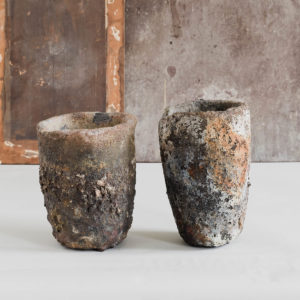
Small pair of foundry crucibles,
£500 -
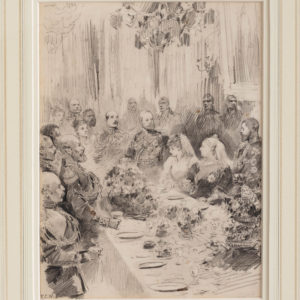
“Wedding Breakfast of the Future King George V” by Richard Caton Woodville Jr.
£495“Wedding Breakfast of the Future King George V” by Richard Caton Woodville Jr.
Richard Caton Woodville Jr. RI. ROI. (7 January 1856 – 17 August 1927) was an English artist and illustrator, was best known his historical battle scenes in the late 19th and early 20th centuries. Woodville spent most of his career working for the Illustrated London News, where he quickly developed a reputation as a talented reporter and writer.£495 -
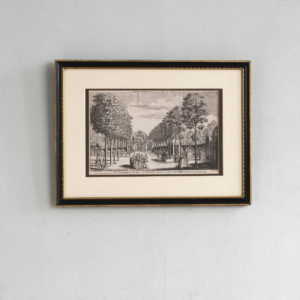
The Triumphal Arches, Mr. Handel’s Statue & c. in the South Walk of Vauxhall Gardens
£495The Triumphal Arches, Mr. Handel’s Statue & c. in the South Walk of Vauxhall Gardens
Based on the work by Samuel Wale and engraved by Benjamin Cole in 1752. Mounted and presented in a Hogarth style frame.£495 -
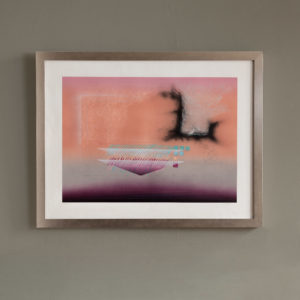
“Progress IV” artists screenprint by Anthony Benjamin (1931 – 2002)
£480“Progress IV” artists screenprint by Anthony Benjamin (1931 – 2002)
Anthony Benjamin (29 March 1931 – 17 February 2002) FRSA, RE was an English painter, sculptor and printmaker. Benjamin was a fellow of the Royal Society of Arts (FRSA) and a member of the Royal Society of Painter-Printmakers (RE)£480 -
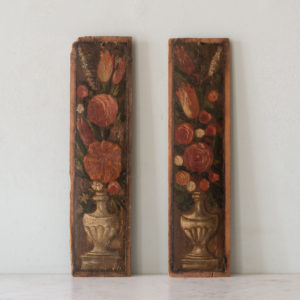
Pair of painted panels
£480 -
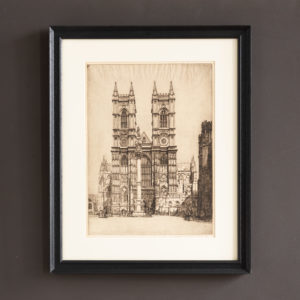
Westminster Abbey by Mortimer Mempes
£480Westminster Abbey by Mortimer Mempes
Mortimer Luddington Menpes. Printmaker, painter of genre, architectural subjects, and writer was born in Alelaide, Australia and came to England c.1875 where he remained until his death in 1938.£480 -
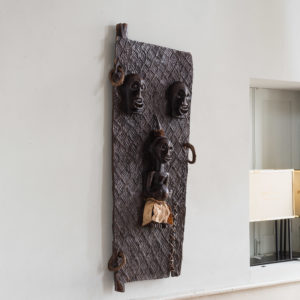
Congolese Songye door
£480 -
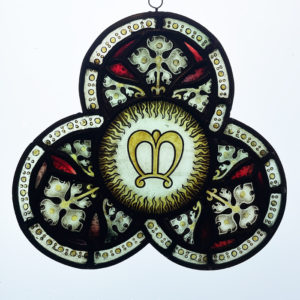
A Victorian leaded stained glass trefoil hanger,
£460A Victorian leaded stained glass trefoil hanger,
the trefoil light centred with a gothic "M" in a sunburst, the lobes painted with foliate ornament, chain hung from wire loops,£460 -
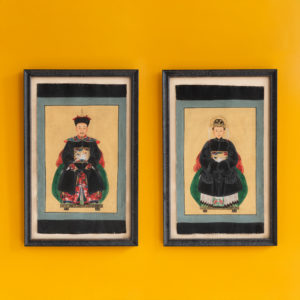
Chinese Ancestor Portraits
£450 the pairChinese Ancestor Portraits
Ancestor portraits form an important part of the Chinese practice of ancestor worship, created as near life size likenesses of the deceased. Families would honour and commemorate their ancestors, carrying out rituals and giving offerings.£450 the pair
Featured Items
-
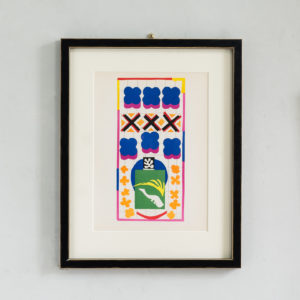
Henri Matisse, ‘The Last Works of Henri Matisse’
£900 eachHenri Matisse, ‘The Last Works of Henri Matisse’
From Verve Vol. IX No. 35/36 published by Tériade under the title 'The Last Works of Henri Matisse'£900 each -

Head of a Girl by George Rouault, Verve Vol 2 / No. 5-6.
£800Head of a Girl by George Rouault, Verve Vol 2 / No. 5-6.
The Verve Review was a purposefully luxurious. It ran from 1937 to 1960, but with only 38 editions available, due to the high degree of design and editorial work dedicated to each issue. Each edition contained unique lithographic prints, commissioned by the editor, and each cover a double-page lithograph elaborated by one of the artists contained within. It was the brainchild of its editor Stratis Eleftheriades, a Greek National who moved to Paris in the early thirties to take part in the growing Modernist movement, writing under the name of Teriade.£800 -

The Four Elements, Earth by Francisco Bores, Verve Vol. 1 / No. 1.
£600The Four Elements, Earth by Francisco Bores, Verve Vol. 1 / No. 1.
The Verve Review was a purposefully luxurious. It ran from 1937 to 1960, but with only 38 editions available, due to the high degree of design and editorial work dedicated to each issue. Each edition contained unique lithographic prints, commissioned by the editor, and each cover a double-page lithograph elaborated by one of the artists contained within. It was the brainchild of its editor Stratis Eleftheriades, a Greek National who moved to Paris in the early thirties to take part in the growing Modernist movement, writing under the name of Teriade.£600 -

Printemps by Marc Chagall, Verve Vol. 1 / No. 3.
£800Printemps by Marc Chagall, Verve Vol. 1 / No. 3.
The Verve Review was a purposefully luxurious. It ran from 1937 to 1960, but with only 38 editions available, due to the high degree of design and editorial work dedicated to each issue. Each edition contained unique lithographic prints, commissioned by the editor, and each cover a double-page lithograph elaborated by one of the artists contained within. It was the brainchild of its editor Stratis Eleftheriades, a Greek National who moved to Paris in the early thirties to take part in the growing Modernist movement, writing under the name of Teriade.£800
